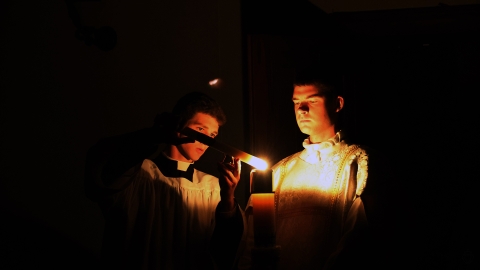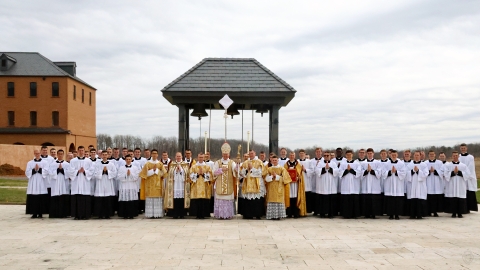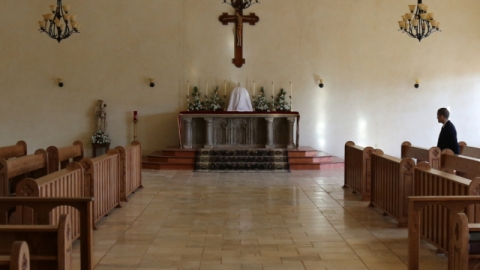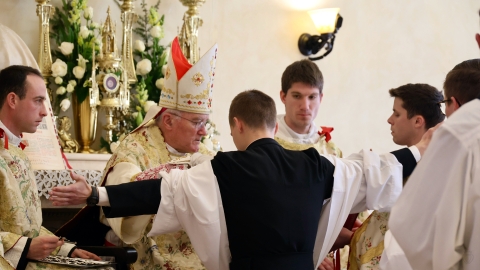Why focus on St. Thomas Aquinas?

St. Thomas Aquinas is acknowledged by the Church to have a unique status even among her greatest theologians. His works and especially his method have been endorsed by the Church as providing the surest path for harmonizing all things true and, in particular, for untangling the modern mind from the muddle which poses as “innovative thinking”.
“Why St. Thomas Aquinas?”
Many people have wondered why a traditional seminary should be named for, and put so much emphasis on, St. Thomas Aquinas. Why should this saint, this Doctor of the Church, be so important to us? Why should a Seminary base the core of its philosophical and theological curriculum on his greatest work, the monumental Summa Theologica? Why not focus on more recent philosophers or schools of thought, who dealt with more modern problems than this 13th century monk? Why so much of St. Thomas?
There are many answers to this question. The deepest, most fundamental answer is this: his teaching, his principles, and his system of thought have long been recognized and revered by the Church as the example, the model by which men may inquire into and discover the truth. Pope Leo XIII made it official in his famous encyclical letter Aeterni patris, in which he gives St. Thomas the Church’s highest approval.
Now far above all other Scholastic Doctors towers Thomas Aquinas, their master and prince. . . His intellect was docile and subtle; his memory was ready and tenacious; his life was most holy, and he loved the truth alone. . . in him not one of the following perfections is wanting: a full selection of subjects; a beautiful arrangement of their divisions; the best method of treating them; certainty of principles; strength of argument; perspicuity and propriety in language; and the power of explaining deep mysteries.
But even before this official proclamation, the works of St. Thomas had received countless honors from many other Popes and Councils of the Church. At the Council of Trent, his Summa Theologica was laid upon the altar beside the Scriptures and the decrees of the Popes. Innocent VI said of St. Thomas: “His doctrine, above all other doctrine with the one exception of the Holy Scriptures, has such a propriety of words, such a method of explanation, such a truth of opinions, that no one who holds it will ever be found to have strayed from the path of truth.” And St. Thomas received the highest dignity possible for a theologian when his teaching was made mandatory for all seminary professors in the highest law of the Church, the Code of Canon Law.
Professors shall treat studies in rational theology and philosophy and the instruction of students in these disciplines according to the system, teaching, and principles of the Angelic Doctor [St. Thomas Aquinas] and hold to them religiously. (1917 Code of Canon Law, C. 1366 ∫2)
Because of these and other seals of approval, St. Thomas is known as the Common Doctor, which means the one whose statements carry the most weight across all theology.
“What makes St. Thomas so smart?”
But is not this emphasis somewhat exaggerated? What is his theology like, that his doctrine is treated with such reverence by the Church, so many years later? Why do the Popes say that one who follows his principles and methods is most sure of finding the truth?
In the first place, St. Thomas Aquinas is distinguished by his remarkable respect and fidelity to the great philosophers of the past and especially to the great Fathers of the Church, who are the voices of tradition. He is willing to learn anything, from anyone who can teach him some portion of the truth. His writings are full to the brim with the words and thoughts of the greatest minds of all time, carefully considered and harmonized into one consistent system of thought.
This humility and docility before the genius of others is what allows St. Thomas to surpass others in attaining to the truth, for truth is conformity to reality. The greatest obstacle to finding the truth is pride, which loves its own thoughts, and refuses to build on the work of others, or to conform to a reality outside itself. The Medieval theologian Cajetan understands this when he says of St. Thomas “So great was his veneration for the ancient and sacred doctors that he may be said to have gained a perfect understanding of them all.” St. Thomas stands in great contrast to modern thinkers, whose unwillingness to receive anything, to accept anything from tradition, has created a world without any firm foundations, a world in which each man and each generation must find the truth for himself, alone. Archbishop Lefebvre knew this, and followed the spirit of St. Thomas, when he had inscribed on his tomb the words “Tradidi quod accepi” (I have passed on what I received).
St. Thomas is known also for the absolute clarity of his methods of logic and reasoning. Perhaps the most central characteristic of St. Thomas’ reasoning is his insistence on starting any inquiry with clear and exact definitions of terms. This initial clarity, this exact knowledge of what we are talking about, helps a man to form the mental habit of making distinctions, to separate the true from the false, whenever they are found mixed. And they are often found mixed, because every error arises because it resembles some truth, and every error survives by being confused with a truth. The greater the truth within a heresy, the more dangerous it is, for people will be more likely to believe it. These half-truths must be purified, and separated into their components, so that we may see and avoid the evil in them. This process of making distinctions forms one of the keystones of St. Thomas’ method.
Because of St. Thomas’ clarity, exactitude, and thoroughness in the truth, it is very hard for someone trained in St. Thomas’ methods to fall into the modern errors. Modern philosophers seek God and explain religion in terms of personal sentiment. They try to reduce objective religious truth to a question of personal experience and feeling. They live by the heart and forget the head. They impose what they want, or what they feel to be true, on reality. And they hate St. Thomas, for they know that these errors cannot stand in the light of his wisdom. As a notorious enemy of the Faith once said, “Take away Thomas, and I will destroy the Church.”
“But why St. Thomas today?”
The modern world is rife with intellectual errors. Foremost among these errors is that of Modernism, which mixes all the heresies, and attacks the Church itself from inside. The two fundamental ideas of Modernism are agnosticism, which causes us to doubt that man can find the truth, and immanentism, which makes all truths subjective. The consequences of both these ideas can be seen in all walks of life. They are the two extremes that rule most of modern society: either we embrace scientific materialism and have no religion, because we can never know God, or we have a religion that is based on pious feelings and ‘inner needs’ alone. And both ideas end by destroying all knowledge, because both deny objective truth.
St. Thomas Aquinas was as far from those two heresies as he could possibly be. He maintained that there really is such a thing as objective truth, about a reality which is outside of us, and not dependent on our likes or dislikes. He stood by the principle that a man can discover the truth for himself, by using his senses and applying his intellect to the things around him. He insisted not only that knowing the truth was possible, but that it was obligatory for every man with the use of reason. He stood up to those in his time, like the heretic Siger of Brabant, who tried to pretend that truth meant one thing in faith and another in science.
There can be no doubt that knowledge of St. Thomas is essential and necessary for a priest in this world of doubt. The system of St. Thomas represents the highest, most complete and exact system of theology ever elaborated in the ages of Faith, when the world was Catholic. If a priest has not formed habits of clear thinking and reasoning, without sentiment, if a priest cannot effectively analyze and refute an error against the Faith, then he will not keep the Faith himself, much less pass it on to others.
Archbishop Lefebvre understood that the modern world denied the possibility of finding the truth, and held up emotion as a substitute. He fought these heresies by making truth the basis of devotion: the mind knowing reality, that the heart might love God. And just as the Archbishop was formed according to the doctrine of St. Thomas in his seminary in Rome, so he formed his own seminarians in the same way, passing on what he had received. Solid doctrine was the basis for soaring devotion. Thus, when the Archbishop knew he was dying, and wished to leave one last gift behind for his spiritual children, he gave us the little book A Spiritual Journey, which is nothing but a collection of truths from St. Thomas, the greatest gift that he could leave us.
A Spiritual Journey)
Image: Apotheosis of St. Thomas Aquinas, by Francisco de Zurbaran, 1631.





